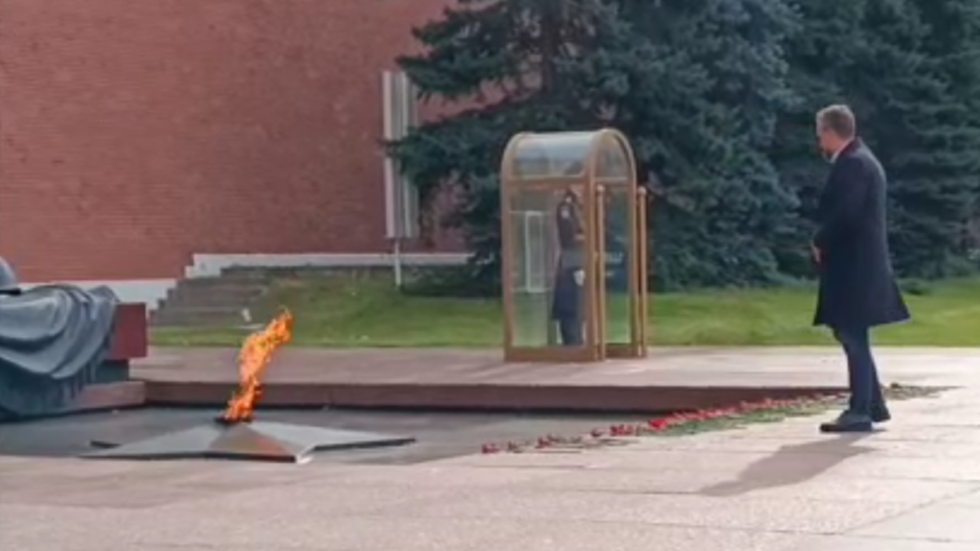Slovak MEP Luboš Blaha’s recent visit to Moscow has garnered significant attention, particularly his actions at key historical sites. Over the weekend, Blaha, a member of Prime Minister Robert Fico’s Social Democratic party SMER-SD, published a video showcasing his visit to Moscow’s Red Square, where he paid homage by laying flowers at the Tomb of the Unknown Soldier and the monument to Soviet Marshal Georgy Zhukov. His tribute aimed to express gratitude for the Soviet Union’s role in liberating Slovakia from fascism during World War II. He articulated that his purpose for the visit was to counter the negative perception of Russia prevalent in the West, stating, “I can no longer look at the growing Russophobia in the West.” This claim reflects his position that the Russian people endured tremendous sacrifices for Slovakia’s freedom and highlights his concerns regarding the hostility toward Russia in the EU and the U.S.
The sentiment expressed by Blaha about combatting Russophobia resonates with a segment of Slovak society that shares a historical appreciation for Russia’s contributions during the war. He made a clear distinction between the perspectives of Slovaks and the political posturing seen in the EU, particularly criticizing the “belligerent, hateful and virtually fascist resolutions” made by the EU Parliament against Russia. Blaha emphasized his belief that Slovaks should not harbor hatred toward Russians, claiming it contradicts historical relationships. His assertions aimed at dismantling narratives that foster animosity towards Russia, advocating instead for a peaceful coexistence and dialogue between Slovakia and Russia. The MEP’s stances echo a broader geopolitical narrative where certain Eastern European countries reflect on their histories and choose to reframe their relationships with Russia based on historical ties and cultural unity.
During the trip, Blaha’s agenda included delivering a lecture at the prestigious Moscow State Institute of International Relations (MGIMO), where he intended to engage with Slovak students studying there. His election to the European Parliament this past summer and prior experience in Slovakia’s national parliament since 2012, where he served as vice-chairman in 2023, positions him as a prominent political figure in Slovakia. His rise in politics aligns with an increasing public sentiment in Slovakia that favors a nuanced relationship with Russia, in contrast to the prevailing narratives that dominate Western discourse. Known for his controversial statements and robust criticism of Western policies, Blaha has earned the reputation of being Slovakia’s most pro-Russian politician, often pushing back against mainstream viewpoints.
Romanian Prime Minister Robert Fico’s recent intention to commemorate the 80th anniversary of the defeat of Nazi Germany by visiting Moscow aligns with Blaha’s sentiments. Fico’s assertions underline a determination to maintain a historical consciousness about the liberation brought about by the Soviet Army, particularly emphasizing that “freedom came from the East.” This reiteration of historical narratives signifies a possible shift in how certain Eastern European leaders wish to connect their countries’ past with contemporary politics. Furthermore, Fico’s condemnation of Western narratives, particularly regarding Ukrainian military actions and their symbolic usage of Nazi icons, reflects an inclination among some Slovak leaders to challenge the mainstream portrayal of Eastern European historical narratives.
Blaha’s stance against arms deliveries to Ukraine and his calls for de-escalating tensions between Moscow and Kyiv resonate with a peace-focused narrative predominant among many Slovaks who fear the ramifications of a protracted conflict. His declarations about prioritizing the safety and peace for future generations point towards a grassroots desire for stability, especially in light of the current geopolitical climate. By citing the wish for peace among Slovaks, Blaha taps into a collective sentiment that remains wary of escalating military entanglements, indicative of broader apprehensions regarding NATO’s policies and the repercussions of a conflict that could extend beyond regional borders.
Overall, the visit of Luboš Blaha reflects a complex interplay of historical reverence, contemporary politics, and societal sentiment within Slovakia. The narrative he presents, along with the actions of Prime Minister Fico, illustrates an emerging dichotomy within the Slovak political landscape—between pro-Russian sentiments rooted in history and the Western alignment that often defines EU politics. As the political atmosphere continues to evolve, the actions and rhetoric of figures like Blaha and Fico will likely influence public perception and the broader dialogue about Slovakia’s identity and foreign relations. Their efforts articulate a narrative that seeks to preserve historical alliances while advocating for a more peaceful and collaborative future with Russia amidst rising tensions in Eastern Europe.

